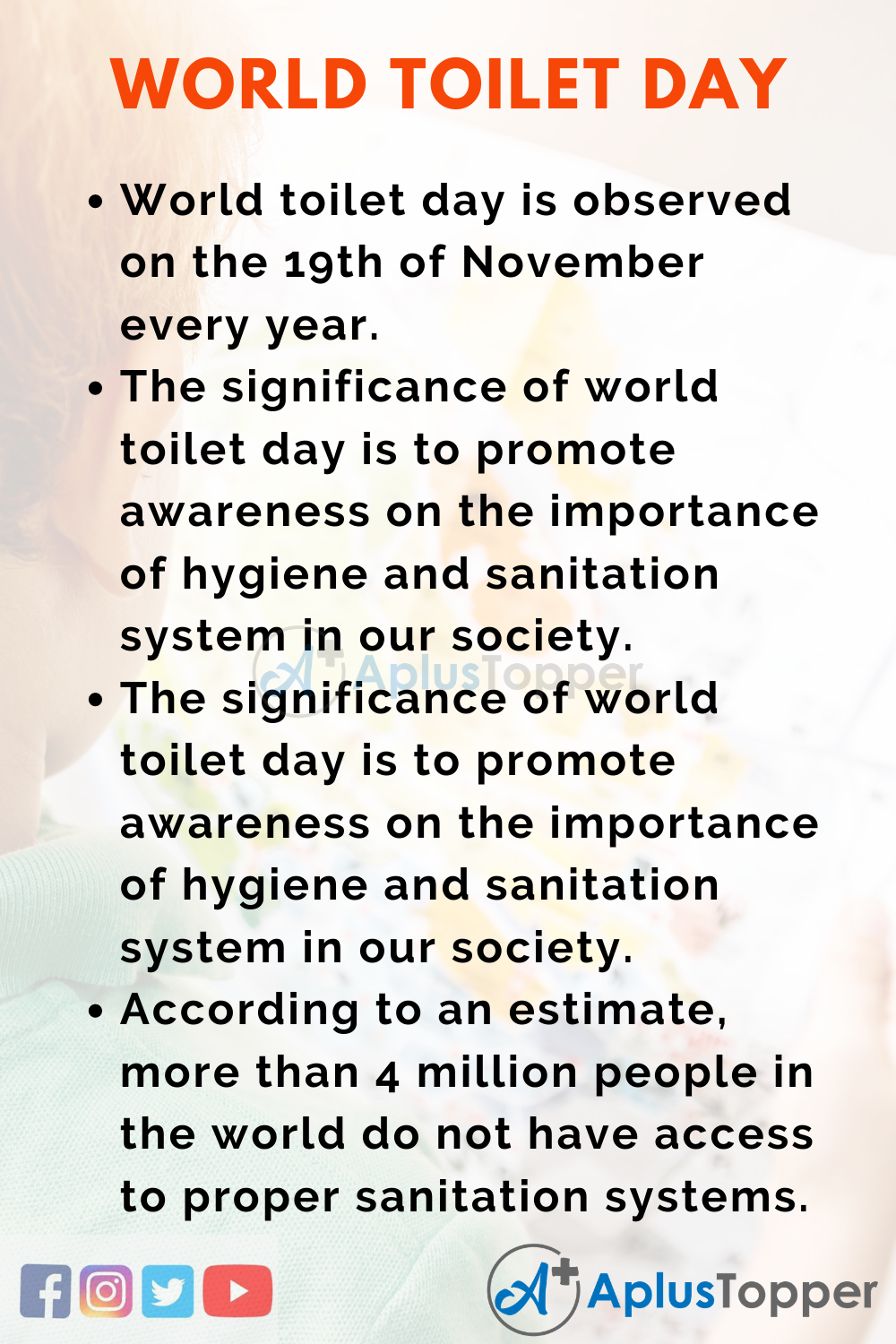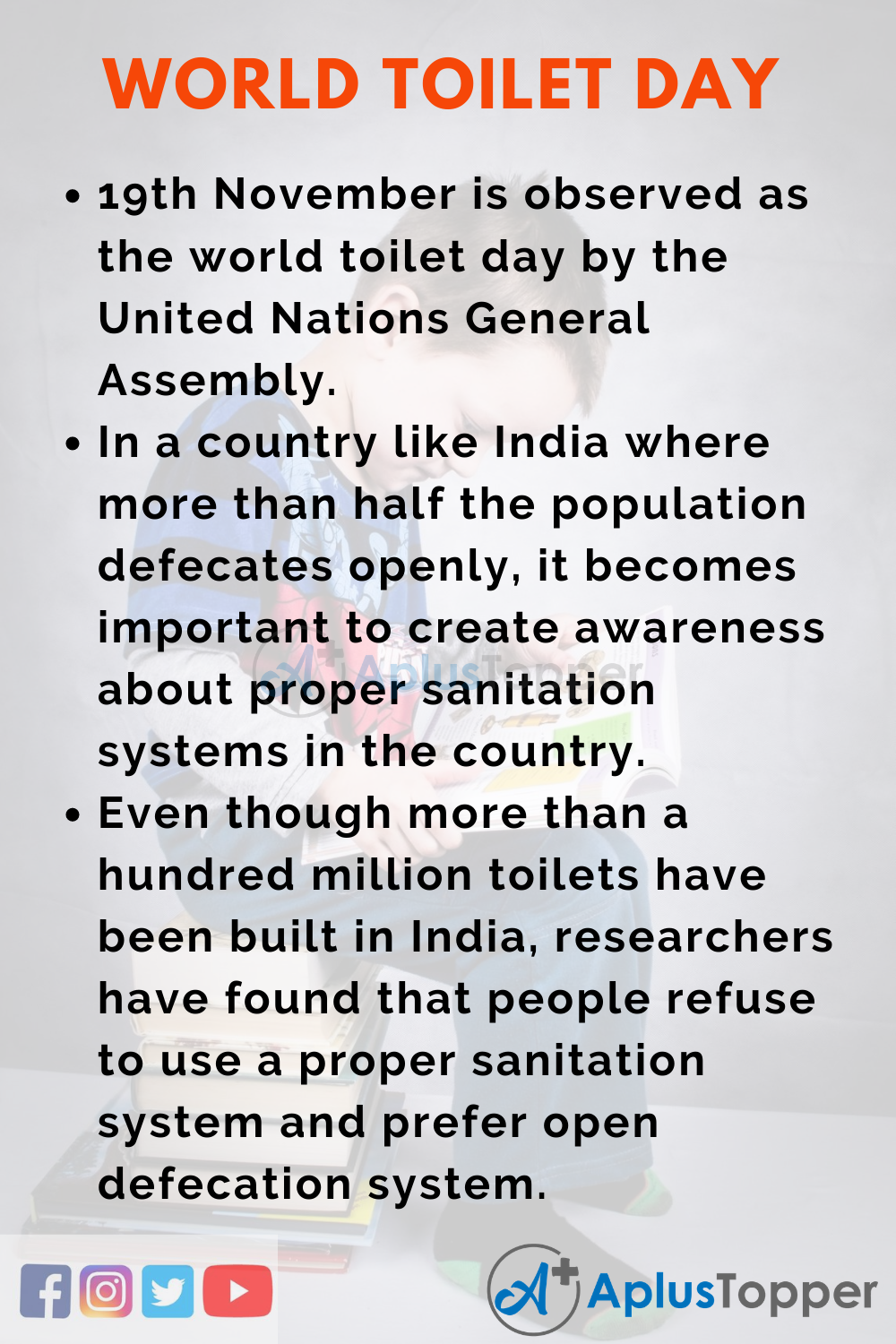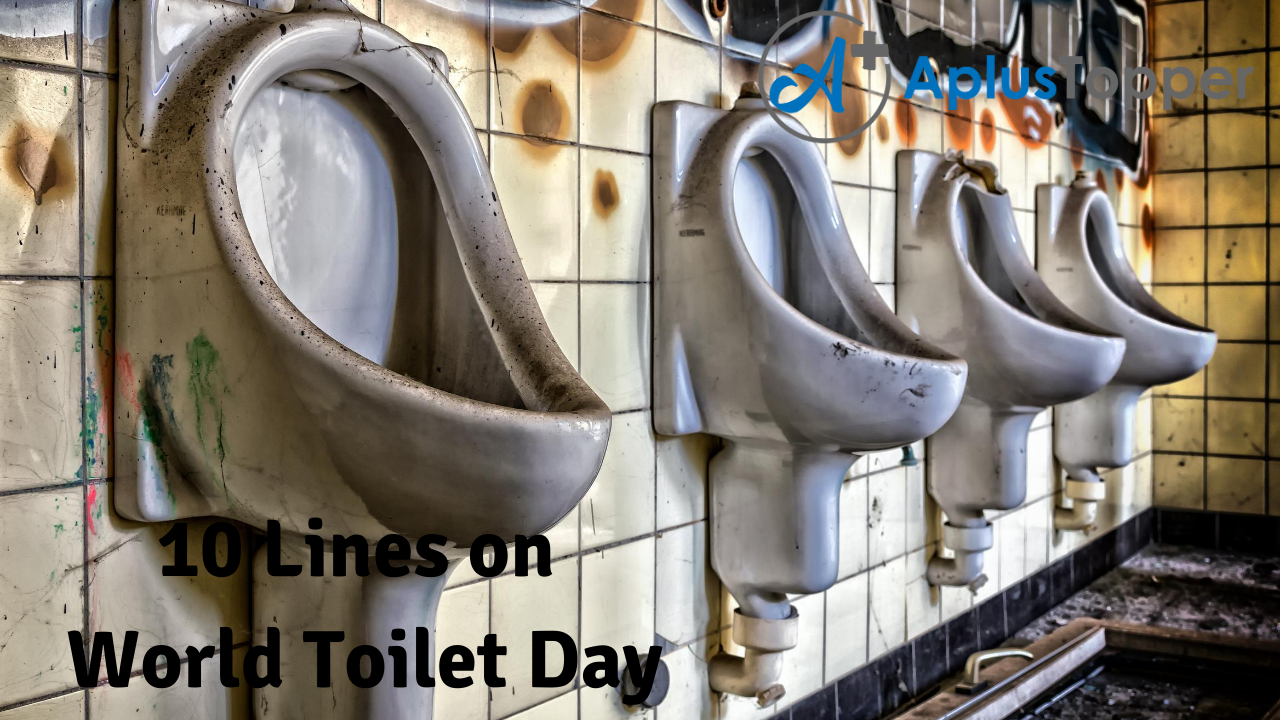10 Lines on World Toilet Day: India is a country with a population of 135 crore people and according to a rough estimate, more than 65% of the population does not have proper sanitation system. This is a serious problem not just in India but many third world countries in Africa, Europe and Asia.
World toilet day is a day that the United Nations observes on the 19th of November for various reasons that we are going to discuss below.
In this particular article on 10 lines on world toilet day, we shall be dividing the article into three different sets of 10 lines on world toilet day which answers certain questions such as what is the significance of world toilet day, what is the history of world toilet day, when is world toilet day celebrated, why is world toilet day celebrated and many more such questions will be answered.
You can read more 10 Lines about articles, events, people, sports, technology many more.
Set 1 – 10 Lines on World Toilet Day for Kids
Set 1 is helpful for students of Classes 1, 2, 3, 4 and 5
- World toilet day is observed on the 19th of November every year.
- The significance of world toilet day is to promote awareness on the importance of hygiene and sanitation system in our society.
- According to an estimate, more than 4 million people in the world do not have access to proper sanitation systems.
- More than 600 million people in the world defecate in the open.
- World toilet day holds a lot of significance for the vulnerable sections of our society.
- It becomes our responsibility to build proper and hygienic sanitation systems for the poor and needy in our country.
- Government of India with Swachh Bharat Abhiyan is aiming to make India open defecation free country.
- Toilets are important to prevent public health crisis and to maintain human dignity in the society.
- World toilet day hold special significance for women in third world countries.
- Many soil-borne and water-borne diseases such as cholera, dysentery typhoid and diarrhoea spread because of lack of proper sanitation system.

Set 2 – 10 Lines on World Toilet Day for School Students
Set 2 is helpful for students of Classes 6, 7 and 8
- United Nations International observance Day on 19th November is known as world toilet day.
- Lack of sanitation systems in many countries is a major crisis that is facing human beings for many years.
- The international community has to come forward to prepare a proper plan where basic sanitation system is available to everyone in every corner of the world.
- Human wastes due to defecating in open aids in spreading diseases such as Cholera or dysentery or dengue that can be fatal.
- The theme of the world toilet day in the year 2018 was “When nature calls”.
- Nature-based sanitation solutions are used to eradicate and treat human waste before it returns to the environment.
- World toilet day hold special significance for women and girls to promote health, safety and dignity in the society.
- The clean India campaign or Swachh Bharat Abhiyan takes cognizance of the lack of sanitation systems in rural parts of India very seriously.
- More than 1.2 billion people in India do not have proper sanitation system at their homes. Millions of people in rural parts of the country use public toilets.
- According to an estimate, more than 19 million toilets have been built across the rural parts of India under the National Rural Sanitation.
Set 3 – 10 Lines on World Toilet Day for Higher Class Students
Set 3 is useful for Students of Classes 9, 10, 11,12 and Competitive Exams
- 19th November is observed as the world toilet day by the United Nations General Assembly.
- In a country like India where more than half the population defecates openly, it becomes important to create awareness about proper sanitation systems in the country.
- Even though more than a hundred million toilets have been built in India, researchers have found that people refuse to use a proper sanitation system and prefer open defecation system.
- Due to various reasons such as lack of awareness, social and societal stigmas and blind believes associated with defecation, people refuse to use latrines and toilets in rural and remote parts of India.
- The swachh Bharat Abhiyan which was launched by Prime Minister of India, Mr Narendra Modi, in 2014 resulting in eliminating public defecation in India by 2019.
- Even though the Indian government claims that India is open defecation free, many researchers suggest that the statistics are misleading.
- It is because of open defecation that many dreadful diseases such as cholera and dengue are spreading in India uncontrollably.
- Because of the lack of proper sanitation system, more than 300000 people have been killed because of diarrhoea and malnutrition between 2014 and 2019 in India.
- Before the launch of swachh Bharat Abhiyan, only 39% of Indian households had access to a proper sanitation system. After the launch of clean India campaign, more than 96% of the Indian population have access to hygienic sanitation systems.
- It becomes the responsibility of the international community to come forward and make our society open defecation free.

FAQ’s on 10 Lines on World Toilet Day
Question 1.
When is the world toilet day observed?
Answer:
World toilet day is observed on the 19th of November every year by the United Nations General Assembly
Question 2.
What is the significance of the world toilet day?
Answer:
World toilet day is observed to create awareness among the people and the governments about the adversities of open defecation.
Question 3.
When was world toilet day observed for the first time?
Answer:
The United Nations General Assembly declared world toilet day in the year 2013
Question 4.
What is swachh Bharat Abhiyan?
Answer:
Swachh Bharat Abhiyan is a campaign launched by Prime Minister of India Narendra Modi to build proper sanitation systems in rural parts of the country which aims to be accessible to everyone.
